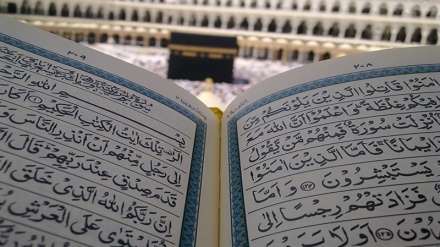Path towards Enlightenment (1016)
Salaam, and welcome to our latest episode of “Path towards Enlightenment”, which is an endeavour to make you and us familiar with an easy and fluent explanation of God’s Final Scripture to all mankind, the holy Qur’an that was revealed to the Last and Greatest of all Messengers, Prophet Muhammad (blessings of God upon him and his progeny).
Last week we completed explanation of “Surah Talaq” which outlines rules of divorce with emphasis on mutual respect, and today we take up explanation of the next Surah, that is, “Surah Tahreem” – the number 66 in the serial order of compilation of the holy Qur’an.
Revealed in Medina it has 12 Ayahs and opens by instructing the Prophet not to prohibit for himself for the purpose of soothing his nagging wives what God has made lawful for him regarding food and choice of consorts. The Surah, named after the phrase in the opening Ayah “lema tuharremu” or “why do you forbid”, mentions the intrigues of two of the several wives the middle-aged Prophet had to marry in the last ten years of his life in order to break the taboos of the age of ignorance, following the passing away of his loyal wife, Hazrat Khadija (peace upon her) with whom he had spent 25 long blissful years without taking any other spouse. It happened that these two women who were accomplices of each other and whose names have been mentioned in books of hadith and history, including those of our Sunni brethren and need not be repeated here, caused offence to the Prophet. God therefore warned them of dire consequences of their misdeeds unless they repent, and consequently urges all believers to be obedient to Divine Commandments in order to guard themselves and their families against Hellfire. The Surah cites examples of two of the virtuous women, that is, Asiya the wife of the tyrannical Pharaoh of Egypt, and the Virgin Mary – the mother of Jesus (peace upon them). It also gives examples of two of the wicked women, by referring to the disbelieving and disobedient wives of the Prophets Noah and Lot.
We start with explanation of the first two Ayahs of the Surah, which read:
“In the Name of Allah the Compassionate the Merciful – O Prophet! Why do you prohibit (for yourself) what Allah has made lawful for you, seeking to please your wives? And Allah is All-Forgiving, All-Merciful.
“Allah has certainly made lawful for you the dissolution of your oaths (of such a kind), and Allah is your Master and He is the All-Knowing, the All-Wise.”
The Prophet was at times entangled with the envious conducts of some of his wives, and in order to pacify them, he once abstained from his lawful right of sipping a glass of honey syrup regularly prepared for him by one of them and for the time being foregoing the turn to consort with another of them, when wrongly told by the jealous ones that his mouth gave a bad smell.
Such refrainment on his part was a personal matter, but since he was the role model of the society and the possibility existed that Muslims might follow such a pattern in their own life, God Almighty instructed the Prophet not to abstain from lawful things.
Ayah number 2 means to say that even if an oath has been taken for refrainment from lawful things, such a kind of oath is not binding, and after all God has decreed proper atonement for disregarding of vows.
These Ayahs teach us that:
- Prophets receive commandments from the Almighty Creator, are always under Divine Protection, and are immune from faults and fallacies.
- The demands and desires of spouses do not alter the injunctions of God regarding the lawful and the unlawful.
- An oath is valid only when it is made in accordance with Divine Laws.
Now let us listen to ayahs 3 and 4 of the same Surah:
“When the Prophet confided to one of his wives a matter, but when she divulged it (to another), and Allah informed him about it and he disclosed [to her] part of it and avoided part of it (in order not to cause embarrassment to her). So when he told her about it, she said, ‘Who informed you about it?’ He said, ‘The All-Forgiving and the All-Aware informed me.’
“If the two of you repent to Allah (it is better for you) since your hearts have certainly swerved, and if you back each other against him (the Prophet), then [know that] Allah is indeed his Guardian, and (the Archangel) Gabriel, and the Righteous among the faithful, and thereafter, the angels are his supporters.”
These Ayahs reveal that besides jealousy, some of the wives of the Prophet had another evil characteristic, namely, divulging of secrets. One of these two erring wives, when confided by the Prophet of a certain matter, divulged it to the other, which shows she and her accomplice lacked the merit of keeping secrets which is one of the qualifications of a loyal wife. When God apprised the Prophet of this scheming against him, he questioned her on her misconduct by alluding to a part of it and refrained from the whole matter out of magnanimity so as not to make her ashamed. Such was her weakness or lack of faith in the Prophet’s Divine mission that she asked him as to how he learned of her misdeed and was told that it was God the All-Aware and All-Forgiving Who had informed him.
Ayah 4 orders the two conspiring wives to repent since their hearts have turned away from the path of God, And if they continue to be accomplices in plots against the Prophet they will not succeed, since he is protected by God Almighty, Who has assigned the Archangel Gabriel and the righteous of the believers, as well as the angels to be his helpers.
These Ayahs teach us the following points:
- Confidence is one of the characteristics of a loyal wife while disclosure of what has been confided is considered conspiracy against him.
- So magnanimous was the behaviour of the Prophet that he was kind to even these conspirators amongst his wives, who used to disturb him.
- Sometimes it is necessary to overlook the mistakes of family members to give them time to repent and make amends.
- The Prophet is always protected by God Almighty who has assigned angels to be his supporters along with the righteous of believers.
In conclusion of this week’s episode we invite you to listen to Ayah 5 of Surah Tahreem:
“It may be that if he divorces you his Lord will give him, instead, wives better than you: [such as are] muslim, true believers, obedient, penitent, devout and given to fasting, virgins and non-virgins.”
Here, the erring wives are told in a tone tinged with Divine Warning that if the Prophet of Islam were to divorce them, God will surely grant him better wives who will be fully loyal to him. The qualities of a loyal wife are being Muslim or those submitting to God alone, Momin or true believers in the Prophet’s mission from the depth of their hearts, devout, humble, always turning to God, sincere worshippers who observe fasting, whether virgins or non-virgins.
From this Ayah we learn that:
- Divorce is the final solution to resolve family tensions, and is the option when either of the spouses is constantly causing trouble.
- Widows and divorced women have the right to marry again.
- The true value of a woman is possession of moral virtues.
RM/AS/SS


